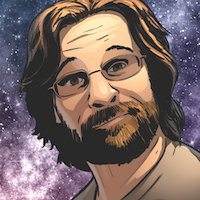Buying Our Comics versus Selling You Our Comics.
We’re a few weeks removed from AwesomeCon and I’m still thinking about the guy at the table next to us. He was an aggressive salesman, calling out his comic’s pitch to anyone in the vicinity. At first I was horribly irritated by his presence, having had a very bad experience with a similarly aggressive salesman at a convention last year, but as the weekend moved along I tuned him out and we did our own thing, without one affecting the other much. In the time since that weekend, I’ve done a lot of thinking about the nature of selling comics.
There are those who want you to buy their comics, and there are those who want to sell you their comics.
I’ve always been someone who wants you to buy my comics. I don’t talk a big sales game, but I’m happy to talk about my work if you ask me about it. I don’t yell my pitch at anyone in the vicinity like a bazaar barker, but I’ll readily give you my prepared Star Power summary if you want to know it. I don’t pressure you to buy anything or convince you that you should purchase a book, but rather I let the work speak for itself. I’ll gladly chat about other comics, the creative process, cool stuff I’ve seen that day, nerd trends (that I’m up-to-date-on), or anything else if you seem friendly. And if, in the process of our speaking you happen to want to buy a book or two, that’s awesome.
The guy next to us wanted to sell you his comic. He yelled his pitch at anyone in the vicinity, over and over, whenever there wasn’t anyone at his table. “Anybody here like Calvin & Hobbes?” was his hook, which he cast on repeat. If someone approached he pitched his work as “if Calvin grew up in Sin City.” If the first line didn’t land, he would shout, “Anybody like NCIS? Anybody like Arrested Development? Anyone here like Die Hard?” Over and over, shouting to hook people with properties they already liked, and pitching his work(s) as movie/comic + another movie/comic. He used words like “target demographic” and “direct market” in all of his interactions. I didn’t feel like I was sitting next to a person with a passion for making comics. I felt like I was next to a salesman whose sole purpose was to sell! sell! sell! his comic with the most appeasing buzzwords, and nothing else mattered that weekend.
That’s not to say selling comics at conventions isn’t important! Between the costs of travel, lodging, food, and the exhibitor table itself, it’s very important to sell enough stuff to cover the costs of attending, at least! But there’s a line between getting people to buy your comics and selling! people your work. We did the former, he did the latter.
To his credit, he’s good at selling his work elsewhere and he’s making some waves with his comic. Industry pros knew who he was, and came to chat with him. It’s been optioned for a movie, apparently. He knew how to talk up his comic to industry folk who listen for the buzzwords and movie/comic comparisons he was pitching.
But the AwesomeCon crowd wasn’t buying it as much as he would have liked. The AwesomeCon crowd wanted to chat with comics creators and discover new things on their own. As the weekend wore on, our more relaxed approach proved more, well, approachable. They wanted to buy comics, not have someone sell them comics.
I want to make perfectly clear, however, that this person was not malicious or greedy. In the brief time we spoke he was very nice to us and said nice things about Star Power’s look and presentation. As much as I disliked his methods and how he was coming across to the crowd, I did not find this person unlikable. If any of today’s blog seems like I’m trash-talking him, or patting myself on the back for being more awesome than him, I don’t mean to. This is meant to be a commentary on an aggressive approach I’ve seen at conventions lately, not the character of the person. It’s meant to express what I feel is the importance of selling your work without Selling! your work.
Are we going to see more of this as the convention season rolls on? I don’t know. It sells books on-the-spot, but I don’t know if it establishes a relationship between a reader and a creator. The latter has always been more important to me than the former, and coming from someone who’s been doing this professionally since 2004, I think I may be right.
